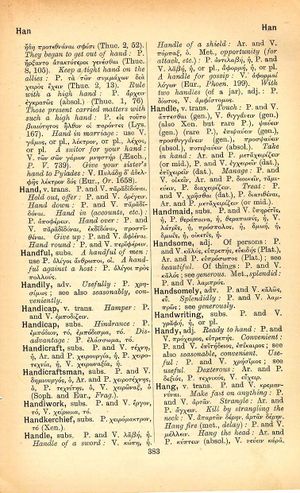hang
Σιγή ποτ' ἐστὶν αἱρετωτέρα λόγου → Sometimes silence is preferable to words → Est ubi loquelā melius est silentium → Das Schweigen ist dem Reden manchmal vorzuziehn
English > Greek (Woodhouse)
v. trans.
P. and V. κρεμαννύναι. Make fast on anything: P. and V. ἀρτᾶν. Strangle: Ar. and P. ἄγχειν. Kill by strangling the neck: V. ἀπαρτᾶν δέρην, ἀρτᾶν δέρην. Hang fire (met., delay): P. and V. μέλλειν. Hang the head: Ar. and P. κύπτειν (absol.), V. νεύειν κάρα. Be hung up: P. ἀναρτᾶσθαι. Be hanged: V. κρεμασθῆναι (1st aor. pass. of κρεμαννύναι. Go and hang yourself, interj.: Ar. φθείρου ἐς κόρακας. Those who made laws I would have go and hang themselves: V. οἳ δὲ τοὺς νόμους ἔθεντο . . . κλάειν ἄνωγα (Eur., Cycl. 338). Hang up, let alone, v. trans.: P. and V. ἐᾶν. Defer: P. and V. ἀναβάλλεσθαι. V. intrans. P. and V. κρέμασθαι, αἰωρεῖσθαι, ἀρτᾶσθαι. Be fastened: P. and V. ἀρτᾶσθαι, ἐξαρτᾶσθαι. My weapons hanging to my side will speak thus: V. (ὅπλα) πλευρὰ τἀμὰ προσπίτνοντʼ ἐρεῖ τάδε (Eur., H.F. 1379). Hang over, threaten: P. and V. ἐφίστασθαι (dat.); see overhang. Hang upon, cling to: P. and V. ἐκκρεμάννυσθαι (gen.), V. ἐκκρήμνασθαι (gen.), ἐξηρτῆσθαι (perf. pass. ἐξαρτᾶν) (gen.); see cling; met., depend on: P. and V. ἐξαρτᾶσθαι (gen., or ἐκ, gen.), P. ἀναρτᾶσθαι (ἐκ, gen.), ἀρτᾶσθαι (ἐκ, gen.).

